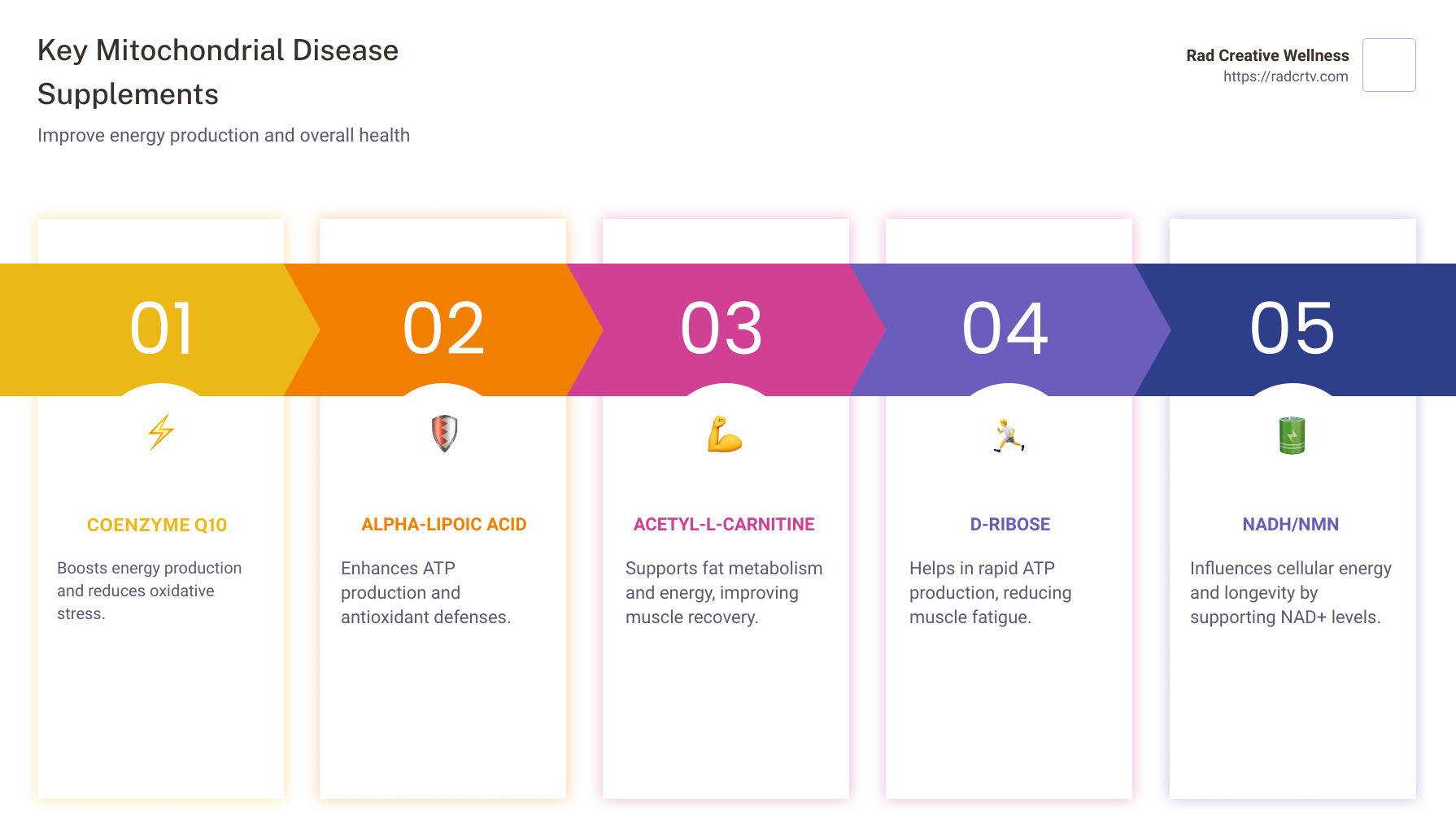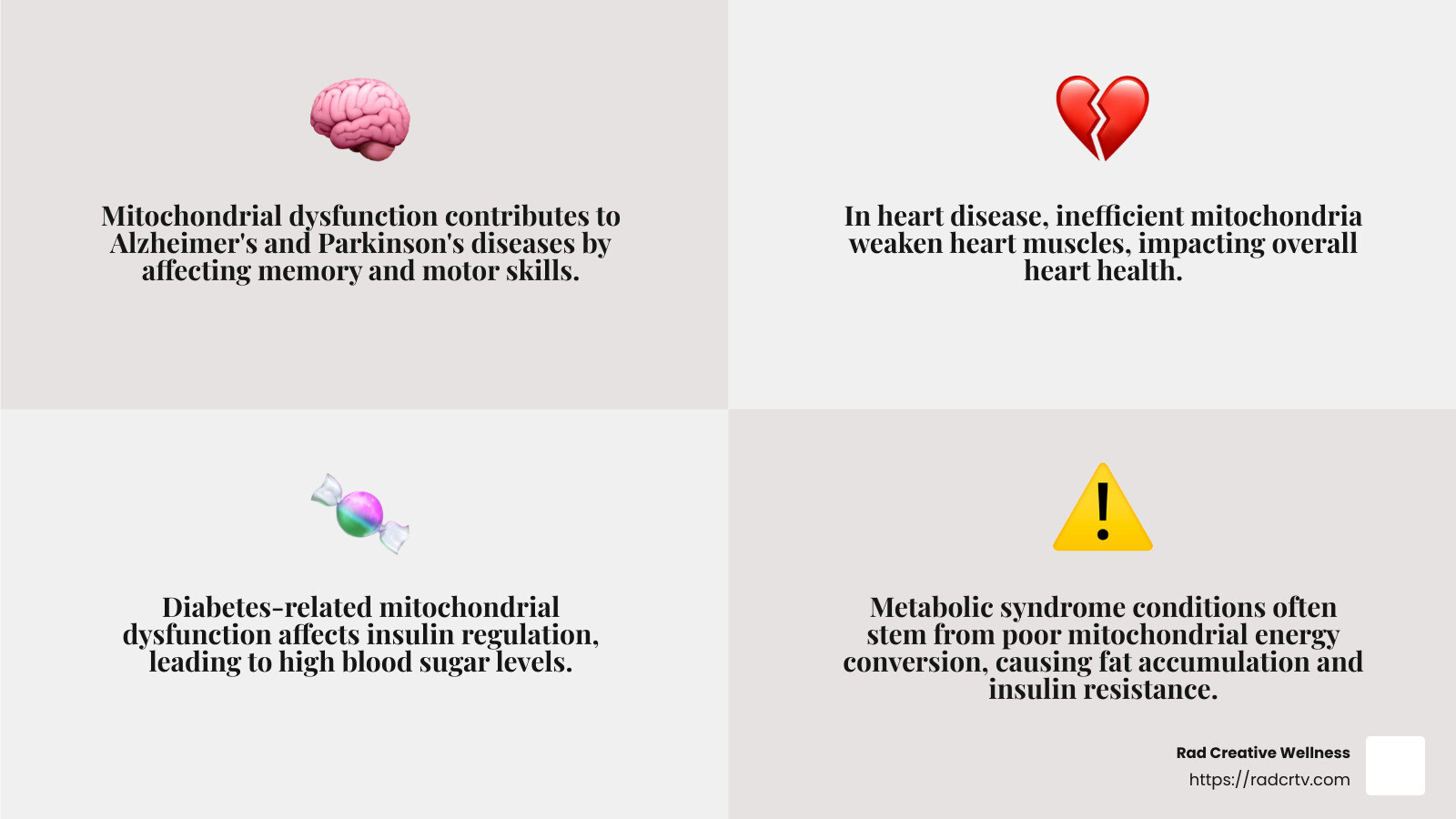
Effective Supplements for Mitochondrial Dysfunction
|
|
Time to read 8 min
|
|
Time to read 8 min
Mitochondrial disease supplements are a crucial part of managing energy levels and combatting the effects of chronic diseases. These supplements aim to boost mitochondria, often called the cell's "power plants," which produce the energy molecule ATP, your body's main energy currency.
When your mitochondria face dysfunction, from conditions like diabetes or heart disease to the fatigue of long COVID, cellular energy drops. Fortunately, employing mitochondrial disease supplements can counteract these effects by revitalizing energy production and supporting overall health.
As Robert Resz, I'm passionate about solveing the complexities of mitochondrial disease supplements. With expertise in wellness and biohacking, I provide science-backed insights custom to improve your well-being. In the following sections, we'll dive deeper into how mitochondrial dysfunction impacts daily life and how targeted supplements can make a difference.
Mitochondrial disease supplements terms you need: - Improve mitochondrial function - Mitochondria and metabolism - Mitochondria boosting foods
Mitochondrial dysfunction is a key player in the aging process and many chronic diseases. But what exactly does that mean for you?
Mitochondria are the powerhouses of your cells. They produce ATP, the energy your body needs to function. When they don't work well, energy levels drop, leading to fatigue and other health issues.
As we age, our mitochondria naturally become less efficient. This decline can contribute to age-related conditions like Alzheimer's and Parkinson's diseases. Research shows that mitochondrial dysfunction is linked to the progression of these neurodegenerative diseases, affecting memory and motor skills.
Mitochondrial dysfunction isn't just about aging. It's also a factor in chronic diseases like heart disease and diabetes. In heart disease, inefficient mitochondria can lead to weakened heart muscles. In diabetes, poor mitochondrial function affects insulin regulation, leading to high blood sugar levels.
Metabolic syndrome is a cluster of conditions, including high blood pressure, high blood sugar, and abnormal cholesterol levels. These conditions often stem from mitochondrial dysfunction. The mitochondria's inability to efficiently convert food into energy leads to fat accumulation and insulin resistance.
Emerging research suggests that mitochondrial dysfunction might play a role in long COVID. This condition features prolonged fatigue and other symptoms after a COVID-19 infection. The virus can damage mitochondria, leading to sustained energy deficits.
Living with mitochondrial dysfunction can feel like running a marathon without training. Everyday tasks become exhausting, and quality of life diminishes. But understanding this dysfunction is the first step to managing its effects.
By recognizing the signs and causes of mitochondrial dysfunction, you can take informed steps toward improving your energy levels and overall health. In the upcoming sections, we’ll explore how specific supplements can support mitochondrial function and help you regain vitality.
When it comes to supporting mitochondrial function, certain supplements stand out. These mitochondrial disease supplements can help boost energy production, reduce oxidative stress, and improve overall health. Let's explore some of the most effective supplements.
Coenzyme Q10 is a powerhouse supplement for mitochondrial health. It acts as an antioxidant and plays a crucial role in energy production. CoQ10 helps cells grow and detoxify by neutralizing harmful free radicals. Research shows it can reverse mitochondrial oxidative stress and improve muscle strength, making it beneficial for those with chronic fatigue and heart issues.
Alpha-lipoic acid is another antioxidant that supports ATP production. It reduces oxidative stress and is particularly helpful for people with diabetic neuropathy. By improving energy metabolism in muscles and the brain, ALA also aids cognitive function and may protect against neurodegenerative diseases.
Acetyl-L-carnitine is essential for transporting fatty acids into mitochondria, where they are converted into energy. This process is vital for muscle recovery, heart health, and reducing fatigue. Studies suggest it improves muscle strength and exercise performance, making it a favorite among athletes.
D-Ribose is a sugar that plays a key role in ATP production. It helps combat muscular fatigue and supports recovery from neurodegenerative diseases. Athletes often use D-ribose to improve workout performance and energy levels.
NADH and NMN are vital for cellular energy. They boost NAD+ levels, which are essential for ATP production and cellular longevity. These supplements can help with chronic fatigue and metabolic syndrome, offering a potential path to sustained energy and vitality.
B vitamins, including thiamine (B1), riboflavin (B2), niacin (B3), and folate (B9), are crucial for energy metabolism. They support muscle performance and cognitive function. A deficiency in these vitamins can lead to fatigue and poor muscle function, so ensuring adequate intake is essential.
L-arginine aids in creatine production and protein utilization. It helps produce nitric oxide, which improves blood flow and can reduce stroke-like symptoms. By supporting muscle strength, L-arginine is a valuable supplement for those with mitochondrial dysfunction.
Creatine is not just for bodybuilders. It's a key player in energy production and helps protect mitochondrial DNA from oxidative stress. By increasing muscle mass and strength, creatine supports overall mitochondrial health and function.
These supplements offer a range of benefits for those dealing with mitochondrial dysfunction. By incorporating them into your routine, you can support your mitochondria and improve your energy levels, muscle strength, and overall well-being.
In the next section, we'll explore natural ways to boost mitochondrial health, including diet and lifestyle changes.
Keeping your mitochondria in top shape isn't just about supplements. Simple lifestyle changes can make a big difference too. Let's explore some natural methods to boost mitochondrial health.
Eating an anti-inflammatory diet is like giving your mitochondria a warm hug. Polyphenol-rich foods are key players here. You can find these in berries, nuts, and vegetables. Think of blueberries, almonds, and spinach. These foods help reduce inflammation and support mitochondrial function.
Intermittent fasting is a popular way to give your mitochondria a boost. It can improve energy levels and promote cellular repair. Some people also try the ketogenic diet, which can support mitochondrial health by providing an alternative energy source.
Ever tried a cold shower? Cold exposure, like ice baths or even cryotherapy, can stimulate heat shock proteins. These proteins act like a repair team for your mitochondria, helping them function better. You don't need to jump into an icy lake—just a quick cold rinse at the end of your shower can help.
Stress management is crucial for mitochondrial health. Yoga and meditation are great tools to keep stress in check. They can help improve mitochondrial output by promoting relaxation and reducing stress hormones.
Catch some sunlight! Just 10 minutes a day can do wonders for your mitochondria. Sunlight helps with ATP production and encourages mitochondrial biogenesis, which means your cells can grow more mitochondria.
When it comes to exercise, variety is key. Walking, running, and weight training all support mitochondrial health. But for a real boost, try high-intensity interval training (HIIT). This type of exercise can increase the number of mitochondria in your cells, improving energy levels and endurance.
These lifestyle changes are simple yet powerful ways to support your mitochondria. Incorporating them into your daily routine can help improve your energy and overall well-being.
Next, we'll tackle some frequently asked questions about mitochondrial disease supplements, offering more insights into how to repair and support your mitochondria naturally.
Several supplements are known to support mitochondrial function and energy production. B vitamins like thiamine (B1), riboflavin (B2), and niacin (B3) play crucial roles in converting food into energy. They help your body's cells use carbohydrates, fats, and proteins efficiently.
Coenzyme Q10 (CoQ10) is another important supplement. It acts as an antioxidant and is essential for energy production in cells. CoQ10 can help reduce fatigue and improve heart health.
NADH and alpha-lipoic acid (ALA) are also beneficial. NADH boosts cellular energy and supports metabolic processes, while ALA helps fight oxidative stress, protecting your cells from damage.
Repairing mitochondria can be as simple as making a few lifestyle changes. Calorie restriction and intermittent fasting have been shown to improve mitochondrial function. These practices encourage your body to repair and produce new mitochondria.
Regular exercise is another effective way to boost mitochondrial health. Activities like walking, running, and weight training increase the number of mitochondria in your cells.
Sleep and relaxation techniques such as yoga and meditation are also key. They help reduce stress and inflammation, allowing your mitochondria to function optimally.
Finally, don't underestimate the power of sunlight and cold exposure. Sunlight supports ATP production, while cold exposure can activate heat shock proteins, helping your mitochondria repair and grow.
Yes, CoQ10 is known to improve mitochondrial function. It helps reduce oxidative stress and inflammation, which can damage cells. By acting as an antioxidant, CoQ10 protects your mitochondria and supports energy production.
In studies, CoQ10 supplementation has shown positive effects on fatigue, muscle strength, and heart health. It's particularly beneficial for individuals with conditions like chronic fatigue syndrome and heart disease.
Incorporating CoQ10 into your routine can be a simple yet effective way to improve mitochondrial health and overall well-being.
Next, we'll explore personalized health strategies and creative wellness practices to further support mitochondrial health.
At Rad Creative Wellness, we believe that everyone has the power to transform their health through personalized strategies and science-based insights. Mitochondrial health is a key focus of our approach, as these tiny cellular powerhouses are crucial for energy production and overall well-being.
Our wellness philosophy combines creativity with scientific practices to offer unique solutions custom to individual needs. By integrating supplements like CoQ10, alpha-lipoic acid, and B vitamins into your routine, you can support your mitochondria and boost your energy levels naturally.
But it doesn't stop there. We encourage adopting holistic lifestyle changes, such as engaging in regular exercise, practicing intermittent fasting, and embracing stress management techniques like yoga and meditation. These practices not only improve mitochondrial function but also contribute to a balanced and fulfilling life.
We invite you to explore our range of products and find how Rad Creative Wellness can support your journey to optimal health. Our collection of wellness products is designed to empower you with the tools needed to achieve your health goals. Visit our collection page and take the first step towards a healthier, more vibrant you.
Your health journey is unique, and we're here to guide and support you every step of the way.


